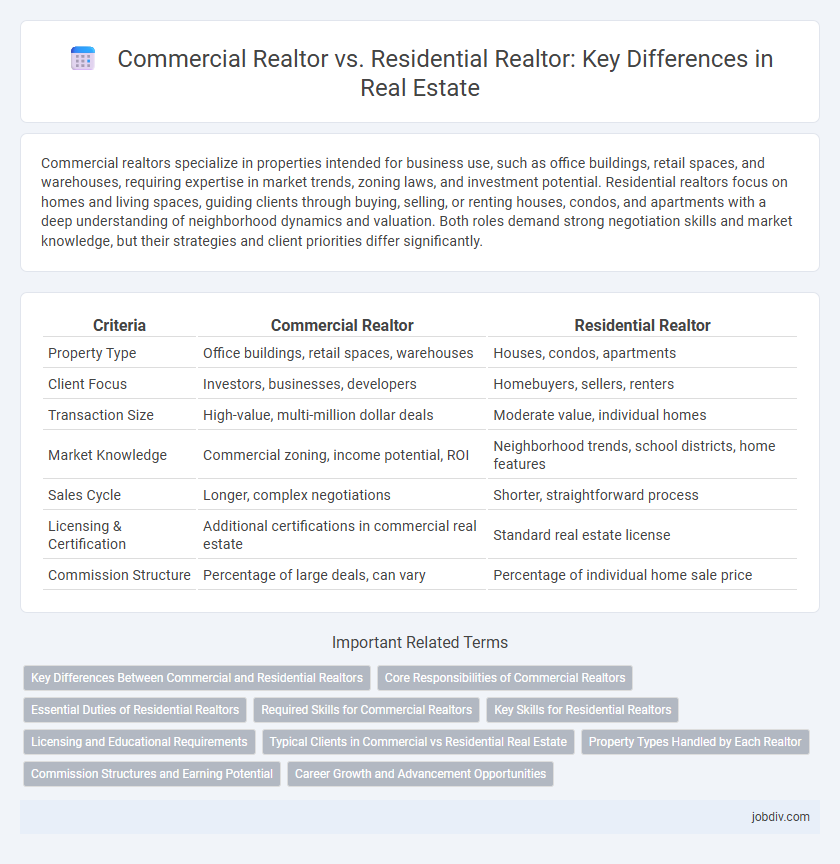Commercial realtors specialize in properties intended for business use, such as office buildings, retail spaces, and warehouses, requiring expertise in market trends, zoning laws, and investment potential. Residential realtors focus on homes and living spaces, guiding clients through buying, selling, or renting houses, condos, and apartments with a deep understanding of neighborhood dynamics and valuation. Both roles demand strong negotiation skills and market knowledge, but their strategies and client priorities differ significantly.
Table of Comparison
| Criteria | Commercial Realtor | Residential Realtor |
|---|---|---|
| Property Type | Office buildings, retail spaces, warehouses | Houses, condos, apartments |
| Client Focus | Investors, businesses, developers | Homebuyers, sellers, renters |
| Transaction Size | High-value, multi-million dollar deals | Moderate value, individual homes |
| Market Knowledge | Commercial zoning, income potential, ROI | Neighborhood trends, school districts, home features |
| Sales Cycle | Longer, complex negotiations | Shorter, straightforward process |
| Licensing & Certification | Additional certifications in commercial real estate | Standard real estate license |
| Commission Structure | Percentage of large deals, can vary | Percentage of individual home sale price |
Key Differences Between Commercial and Residential Realtors
Commercial realtors specialize in properties used for business purposes, such as office buildings, retail spaces, and industrial properties, requiring expertise in market analysis, investment value, and lease negotiations. Residential realtors focus on homes, condominiums, and other dwellings tailored for individual or family living, emphasizing neighborhood trends, school districts, and emotional factors in buying decisions. The key differences include transaction complexity, client types, property valuation methods, and marketing strategies specific to commercial versus residential real estate sectors.
Core Responsibilities of Commercial Realtors
Commercial realtors specialize in facilitating transactions involving office buildings, retail spaces, industrial properties, and multifamily apartment complexes, focusing on investment analysis, lease negotiations, and market trend assessments. Their core responsibilities include conducting detailed financial evaluations, managing property marketing strategies tailored to business clients, and guiding complex contract processes to maximize returns on commercial real estate investments. Mastery in zoning laws, commercial financing, and client relationship management distinguishes commercial realtors from residential counterparts.
Essential Duties of Residential Realtors
Residential realtors specialize in assisting clients with buying, selling, and renting homes or residential properties, ensuring a smooth transaction process by conducting market analyses, coordinating showings, and handling negotiations. They provide personalized guidance to buyers and sellers by understanding individual preferences, local neighborhood trends, and zoning regulations. Their expertise in residential property contracts, mortgage processes, and inspections is critical to protecting client interests and securing optimal deals.
Required Skills for Commercial Realtors
Commercial realtors require advanced skills in market analysis, financial modeling, and negotiation to handle complex transactions involving office buildings, retail spaces, and industrial properties. Expertise in zoning laws, investment strategies, and client relationship management is crucial for advising businesses and investors on maximizing property value and returns. Strong communication and networking abilities enable commercial realtors to connect with corporate clients, developers, and stakeholders effectively.
Key Skills for Residential Realtors
Residential realtors excel in interpersonal communication, local market knowledge, and negotiation skills to help clients find ideal homes. They must understand zoning laws, school districts, and neighborhood amenities to provide tailored property recommendations. Expertise in staging, pricing strategies, and managing client emotions is crucial for successful residential transactions.
Licensing and Educational Requirements
Commercial realtors typically require specialized licensing and advanced education focusing on property investment, market analysis, and commercial law, often including certifications like CCIM (Certified Commercial Investment Member). Residential realtors must obtain a general real estate license, which involves completing pre-licensing courses and passing state exams emphasizing residential property laws and transactions. Both sectors demand ongoing continuing education, but commercial real estate professionals usually pursue additional training tailored to complex commercial property dealings.
Typical Clients in Commercial vs Residential Real Estate
Commercial realtors typically serve business owners, investors, and developers seeking office buildings, retail spaces, or industrial properties, focusing on maximizing return on investment and long-term business growth. Residential realtors primarily work with individual homebuyers, sellers, and renters aiming to find personal living spaces such as single-family homes, condos, or apartments, with emphasis on neighborhood, amenities, and family needs. Understanding the distinct client profiles in commercial versus residential real estate is crucial for tailoring marketing strategies and negotiation approaches.
Property Types Handled by Each Realtor
Commercial realtors specialize in properties such as office buildings, retail spaces, industrial warehouses, and multifamily complexes, catering to investors and businesses seeking income-generating assets. Residential realtors focus on single-family homes, condominiums, townhouses, and vacation properties, assisting individuals and families in buying or selling primary residences or second homes. Each type of realtor applies expertise tailored to the unique transaction processes and market dynamics of their respective property types.
Commission Structures and Earning Potential
Commercial realtors typically earn higher commissions, often ranging from 3% to 6% of the property's sale price, due to the larger transaction values compared to residential realtors, whose commissions generally range between 5% and 6% but are split between buyer and seller agents. The earning potential for commercial realtors increases significantly with successful leases and sales of high-value properties, including office buildings, retail spaces, and industrial sites. Residential realtors benefit from higher transaction volume but usually have lower individual transaction values, which impacts their overall commission earnings.
Career Growth and Advancement Opportunities
Commercial realtors often experience faster career growth and higher earning potential due to larger transactions and complex deals in sectors like office, retail, and industrial properties. Residential realtors typically face more frequent transactions but lower individual commission rates, leading to steadier but slower career progression. Specialized skills in market analysis, negotiation, and client management significantly enhance advancement opportunities in both commercial and residential real estate careers.
Commercial Realtor vs Residential Realtor Infographic

 jobdiv.com
jobdiv.com